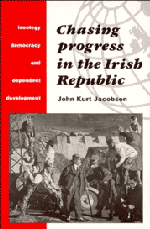Book contents
- Frontmatter
- Contents
- Acknowledgments
- Introduction
- 1 Reflex modernization: state, ideology and dependent development
- 2 Perils of planning: foreign capital, domestic policy, and the problem of state “strength”
- 3 The pale replica
- 4 The rising tide
- 5 Pushbuttons and pragmatists
- 6 Governability and corporatist compromise
- 7 Getting it right: debt, taxes, and industrial strategy, 1984–1990
- Afterword: 1991–1993
- Bibliography
- Index
6 - Governability and corporatist compromise
Published online by Cambridge University Press: 07 September 2010
- Frontmatter
- Contents
- Acknowledgments
- Introduction
- 1 Reflex modernization: state, ideology and dependent development
- 2 Perils of planning: foreign capital, domestic policy, and the problem of state “strength”
- 3 The pale replica
- 4 The rising tide
- 5 Pushbuttons and pragmatists
- 6 Governability and corporatist compromise
- 7 Getting it right: debt, taxes, and industrial strategy, 1984–1990
- Afterword: 1991–1993
- Bibliography
- Index
Summary
There was a time in official economic circles when planning was fashionable. We had some good shots at it. Then we had some that came unstuck and we abandoned it altogether. We had serious thoughts about full employment at a period which now seems not just a few years ago but an infinity away. Nobody talks about it anymore. Is it a dirty word?
Justin Keating, Parliamentary Debates, Dail Eireann (1972)In the context of a neo-colonial dependency this chapter examines governmental “bargaining” with producer groups and “bidding” for consumer group support at the polls from 1969 through 1984. We concentrate on the period from 1978, when industrial policy hit its highwater mark, to 1984 when the Telesis Report signaled the end of the strategy. Samuel Beer argues – or says he is tempted to argue – that just “as great retailing organizations manipulate the opinion of their markets, creating the demand of which in economic theory they are supposed to be the servants, so also the massive party organizations of Collectivist politics create the opinion which in democratic theory they are supposed merely to reflect.” Parties shape and condition the voters' sense of possibilities and alternatives. Anderson describes “paradigms of public choice” which specify the grounds appropriate for making claims within a given political order, defining the boundaries of admissible argument, and which are themselves at stake in political struggle.
- Type
- Chapter
- Information
- Chasing Progress in the Irish RepublicIdeology, Democracy and Dependent Development, pp. 127 - 156Publisher: Cambridge University PressPrint publication year: 1994



